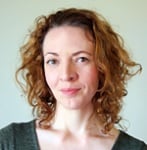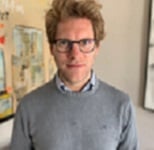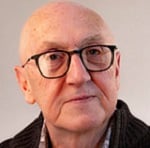
Imogen Roberts, an actor with Down Syndrome, in a performance of MADHOUSE in 2018
Photo: Helen Murray
The big debate: How can the sector better support neurodiversity?
ArtsProfessional asked people working at the intersection of arts and neurodiversity what changes are needed.
Conversations about increasing diversity in the arts and cultural sectors often skim over engaging with neurodiversity. Here people working in the sector share their views on making space in our institutions, auditions, performances and recruitment practices.
 Steve Moffitt: 'One simple thing that most arts organisations can offer: space'
Steve Moffitt: 'One simple thing that most arts organisations can offer: space'
Through our close collaboration with over 40 creative subject teachers working with young people with additional educational needs, A New Direction has first-hand experience of the challenging times currently faced by disabled and neurodiverse young people. With cuts to vital services and provision, not least education, it’s more important than ever that other sectors step in to provide support.
There is one simple thing that most arts organisations can offer: space. Space to explore, develop, get creative, learn and have fun. A New Direction’s partnership with the I Am At Tate Exchange Festival has been providing d/Deaf, disabled and neurodiverse children and young people with a space to celebrate their creativity for the past 3 years, while also making disability more visible in London’s cultural venues. For many of the young people involved, it has been their first time visiting Tate Modern – a stark reminder that many neurodiverse and disabled people still consider our amazing cultural spaces to be off-limits.
It is now our job to change this. By working to make our spaces open and accessible for everyone, the arts and cultural sector can play a big role in demonstrating that all people have the right to play an active part in our culture, and in society as a whole.
Steve Moffitt is the CEO of A New Direction
 Rhiannon Lloyd-Williams: 'People often think accessibility ends with getting people through the door'
Rhiannon Lloyd-Williams: 'People often think accessibility ends with getting people through the door'
As an autistic playwright, I know how small things can help welcome autistic adults into the theatre. People often think accessibility ends with getting people through the door; if you can physically get into the building, then our work is done – but welcoming accessibility is something else altogether.
For autism, that often means lots of information online. Accessible theatres have information about parking and public transport, photos of the venue both inside and out, floor-plans to work out a route, video walkthroughs, quiet spaces to retreat to and information about the performance itself.
For my play, 'The Duck', we considered how music and lights can overwhelm the audience and kept them simple. We aspire to a respectful accessibility, where we give you the information you need to make your own decision about whether this show is right for you. We tell you there will be a few loud parts and one instance of audience interaction, and we tell you what to do and where to sit if you don’t want to interact. We give you permission to leave and return if you need to. We give control back to our audience to be who they are.
Better information can be the difference between feeling welcomed into the arts or feeling like it’s another alien world to be excluded from.
Rhiannon Lloyd-Williams is Managing Director of Autact Theatre
 George Panton: 'Filling out lengthy forms for the Arts Council … almost requires an MBA'
George Panton: 'Filling out lengthy forms for the Arts Council … almost requires an MBA'
I was found to be very high on the dyslexic scale at a young age. I was capable and willing to learn but my strengths and potential were not realised in what was a rigid educational structure that simply didn’t allow me to demonstrate fully what I was capable of achieving.
Two decades on, although there is much greater awareness of neurodiversity, institutionalised and archaic procedures live on in wider society. Recruitment processes – job applications, induction days, management development programmes – all are designed for neurotypical people. The art world is no exception.
Filling out lengthy forms for the Arts Council is a skill in itself, and almost requires an MBA to complete. On its diversity section it asks for ethnicity, age, if you are deaf of not, your gender and your sexual orientation. But nothing on neurodiversity. Just fill out the forms, add a business plan with a full financial summary and ‘we’ll consider you’. You'd expect better from an institution with the strapline, "we champion, develop and invest in artistic and cultural experiences that enrich people's lives".
George Panton is the Founder and CEO of art-selling platform Framd
 Gus Garside: 'Better opportunities for autistic artists and performers would enrich us all'
Gus Garside: 'Better opportunities for autistic artists and performers would enrich us all'
Greta Thunberg, the Swedish environmental activist, has demonstrated to the world the value of speaking in an uncompromising manner, saying “Asperger is not a disease, it is a gift”.
There are innumerable autistic artists who provide new insights into complex issues. There’s digital artist Will Hanekom, who questioned what kind of humans we want in our world in the Carousel/University of Birmingham online graphic novel 'Curing Perfect'. And there is actor Nick Priest, who performed in the RSC production of 'The Seven Acts of Mercy' – a powerful and angry questioning of exactly what, if anything, art can change. And a platform for autistic filmmakers within the International Oska Bright film festival continues to grow, with 2000 submissions this year.
Controversy still continues over the use of non-disabled actors, such as in the lead roles of 'The Curious Incident of the Dog in the Night Time' or the recent stage production of 'Rain Man'. It is argued that this is fine, because playing a range of characters is what an actor does. The argument would be more credible if we saw autistic and other neurodiverse actors playing Hamlet or Rambo on our main stages and screens.
What the arts sector can do to better support neurodiversity is to dedicate more thought and practical action to accessible training, auditioning and casting. Better opportunities for autistic artists and performers would enrich us all. As autistic filmmaker Tobi Loxton says: "we want more authentic and positive representation on screen."
Gus Garside is National Co-Ordinator for Creative Minds
Join the Discussion
You must be logged in to post a comment.